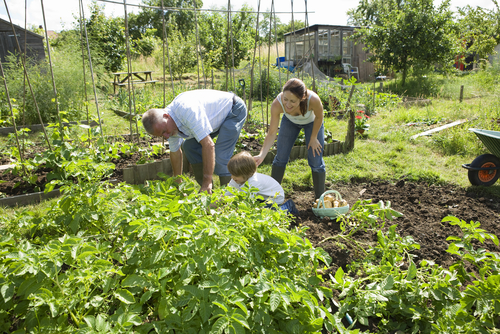
This is a tough one for me. In the past when I heard the term “Earth Day,” my mind would go to things like global warming, becoming a vegetarian and driving around town in my brand new electric car. But actually, “Earth Day” is really not about that at all; rather it’s about the importance of keeping our planet healthy and clean and taking action to do something about it.
If you’ve had the opportunity to travel, I would guess you have seen some pretty amazing sights. I know that when I saw the Grand Canyon for the first time, or when I first gazed upon the enormity of Lake Michigan, I was in awe of what a wonderful planet we truly have. Over the years I have become more aware of the importance of preserving our natural resources.
We all have a responsibility to take care of what God has entrusted to us. Earth Day, which falls on April 22nd, is a great opportunity to get your family talking about and involved in some activities that will reinforce the importance of being good stewards of our natural resources. Plus, it can be a great bonding experience for the entire family doing something outdoors at a time of year that’s usually warm enough to make volunteering outdoors an enjoyable experience. Here are some suggestions for Earth Day activities your family may enjoy.
Community Gardens
Some neighborhoods have small (or no) backyards (can you say New York City?) Others are defined as “food deserts” because there are few local grocery stores. Residents who don’t have cars often have to take public transit a long way to get any food they can’t find in a convenience store, and they can’t bring very many groceries back with them if they’re riding the bus! Food deserts can be rural, too, and there’s generally no public transit out in the country. To solve this problem, many neighborhoods have started to create community gardens in vacant lots or in parks. Community gardens typically need people who can help build raised beds, as they’re often re-using land with soil unsuitable for direct planting. This way, everyone has the space to grow food and can share knowledge and resources. If you happen to live close to one, the spring is always a good time to volunteer to help clean up and plant.
Roadside/Park Clean-ups
A lot of litter accumulates along roadsides and in parks during the winter, when the weather is nasty and no one wants to do anything about it. There are usually all sorts of clean-ups scheduled for Earth Day, and if you can’t find one organized by someone else, you can take the lead to get a group together in your neighborhood. Make sure to sort the recyclables from the trash when you’re done!
Trail Maintenance
Storms in the fall and spring often result in fallen trees and limbs that block park paths and create an obstacle. And the bridges and other amenities in parks often need maintenance, too. If you’re handy with tools or a chainsaw, you can help clear paths and make it easier for visitors to discover local wild spaces.
Watershed Protection
Our local rivers and streams often suffer from polluted runoff. Oil and antifreeze, fertilizer, and other chemicals go down street drains and end up in our waterways. Look for watershed preservation groups in your area. Many of them host a day in the spring or fall when they train volunteers like you to conduct water sampling, and then send you out into the field. They can cover a lot more ground in a day with your participation! Clean-ups along waterways are common Earth Day events, too.
Pollinator Habitat
Gardens need pollinators, and as you may have heard, bee and butterfly populations are suffering due to the rise of neonicotinoid pesticides. These chemicals are often used on garden plants to prevent pests, but kill beneficial insects, too. Many schools and parks are looking to create bee and butterfly habitats free of these pesticides. They need people to source plants that haven’t been treated with neonic chemicals or start them from seed, and to help with planting and maintenance. Groups like Monarch Watch, a national organization that preserves and studies Monarch butterflies, will certify the habitat for you and send a sign for you to post. And of course, you can start one of these gardens in your own backyard. It’s a fun family project, and encouraging pollinators will make your family’s vegetable garden more productive, as well.
It’s that time of year when the warmer weather has us all itching to get outside and enjoy God’s creation. Earth Day gives us a perfect opportunity to talk to your family about the blessings of nature, and protect the beautiful world that has been entrusted to us. Why not make plans now to head outdoors and perform an act of service together?
Please feel free to share this with others.
God Bless,
Doug Hedrick

